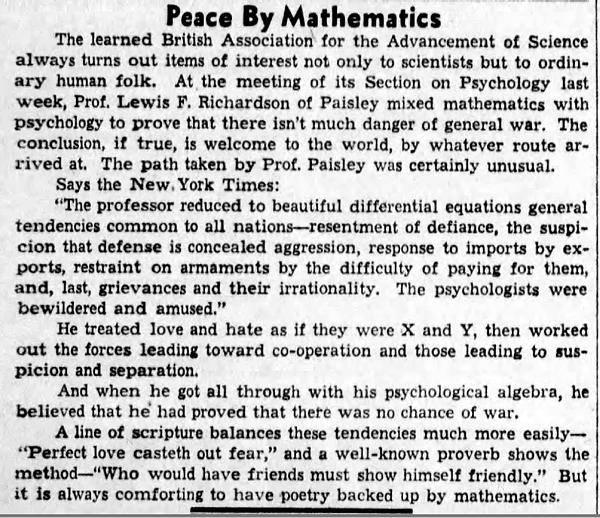Predicting war by mathematics
At an August 1938 meeting of the British Association for the Advancement of Science, Professor Lewis F. Richardson attempted to use mathematics to predict the likelihood of war:
He concluded there was "no chance of war," which proved to be a somewhat inaccurate prediction.

Encyclopedia.com offers some more info on what Richardson was up to:
Despite the eccentricity of his mathematical war-prediction model, Richardson was apparently quite influential in the history of mathematics. Wikipedia notes that he did pioneering work in mathematical techniques of weather forecasting, as well as in the study of fractals.
The professor reduced to beautiful differential equations general tendencies common to all nations — resentment of defiance, the suspicion that defense is concealed aggression, response to imports by exports, restraint on armaments by the difficulty of paying for them, and, last, grievances and their irrationality.
He concluded there was "no chance of war," which proved to be a somewhat inaccurate prediction.

The Alexandria Town Talk - Sep 27, 1938
Encyclopedia.com offers some more info on what Richardson was up to:
Richardson viewed war instead in Tolstoyan fashion, as a massive phenomenon governed by forces akin to the forces of nature, over which individuals have little or no control. Accordingly, he ignored all those intricacies of diplomatic-strategic analysis usually pursued by political historians and turned his attention to quasi-mechanical and quantifiable processes which, he assumed, govern the dynamics of the international system of sovereign states.
Despite the eccentricity of his mathematical war-prediction model, Richardson was apparently quite influential in the history of mathematics. Wikipedia notes that he did pioneering work in mathematical techniques of weather forecasting, as well as in the study of fractals.
Comments
You might want to edit that opening sentence.
Posted by F.U.D in Stockholm on 01/10/21 at 07:22 AM
Prof. Paisley? Isn't he a Clue character?
Posted by Virtual in Carnate on 01/10/21 at 10:22 AM
So he worked on weather forecasting? It seems that he didn't learn his lesson on accuracy in that field either.
Weather prediction is, at best, like the war prediction, a crap shoot. I once witnessed a storm dumping an inch or so of rain when none was predicted in the Pittsburgh area. The forecast was for dry and hot. Ironically, the city was at the time the headquarters for AccuWeather, which touted itself as the most precise predictor in the world. Ha, ha, ha!
Weather prediction is, at best, like the war prediction, a crap shoot. I once witnessed a storm dumping an inch or so of rain when none was predicted in the Pittsburgh area. The forecast was for dry and hot. Ironically, the city was at the time the headquarters for AccuWeather, which touted itself as the most precise predictor in the world. Ha, ha, ha!
Posted by KDP on 01/10/21 at 12:17 PM
Right, KDP. It would simplify things if structural engineering were practiced like weather forecasting: "There's a 70% chance this building won't collapse."
Posted by Virtual in Carnate on 01/10/21 at 12:26 PM
F.U.D. -- Thanks!
Posted by Alex on 01/10/21 at 02:37 PM
Still the same.
Posted by F.U.D in Stockholm on 01/11/21 at 02:41 AM
More than one mistake. Think I've got them all now. My brain was on vacation when I wrote that sentence.
Posted by Alex on 01/11/21 at 12:56 PM
"I just finished shoveling four inches of 'partly cloudy' from my driveway" is an old meme.
International politics falls under the general heading of 'chaos theory exemplar,' rendering them immune to predictions. It's sort of like how you should never trust economic models, because if they were in any way accurate, the people creating them could have become billionaires instead of remaining lowly-paid professors.
International politics falls under the general heading of 'chaos theory exemplar,' rendering them immune to predictions. It's sort of like how you should never trust economic models, because if they were in any way accurate, the people creating them could have become billionaires instead of remaining lowly-paid professors.
Posted by Phideaux on 01/11/21 at 07:20 PM
Commenting is not available in this channel entry.

Category: Science | War | 1930s